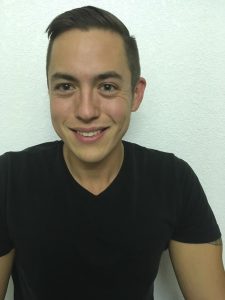Finding Stories of Hope and Disappointment in Kenyan Archives

Christian Alvarado, PhD student in the History of Consciousness program at UC Santa Cruz, researches gender and revolutionary politics in the Kenyan educational system. Previously, the significant expense involved in traveling to do archival work in Africa had kept a research trip there out of Alvarado’s reach. This summer, a THI Summer Research Fellowship gave Alvarado his first opportunity to travel to Nairobi to an archive related to his doctoral research interests. THI spoke with Alvarado about the Kenyan National Archive, the materials he interacted with there, and the personal impacts of his trip.
——–
Today so much information is available online. Why travel to the archives in person?
The Kenyan National Archive’s collections are undergoing digital cataloging, but in the meantime the archives remain print-based. Due to this, having time to physically sort through lists of collections was imperative to my research process. I needed a significant research stay to make the trip possible. THI’s support enabled me to spend two weeks in the archives. In addition, my research process would have been much more arduous without the help of the archives’ knowledgeable and hardworking staff.
You research the Kenyan educational system. Tell us about some specific materials from the archives—what did you look at? Did any collections stand out?
All of the collections that I had the opportunity to work with were amazing in their own ways. Chronologically they ranged from the late 19th century until around the mid-1970s. Each provided me with critical insight into the records and written memories of students, educators, missionaries, and an array of other people involved in the Kenyan educational system. These records varied greatly in terms of particular content and material composition. For example, one of the largest collections I studied was that of the Church Missionary Society of Kenya, which operated a vast network of educational programs ranging from conventional schools to community outreach programs with diverse objectives. This collection spans almost a century and is composed largely of official communiques, meeting minutes, and operational handbooks. This collection offered incredibly detailed information on day-to-day life for religious educators and their students.
Often archival work leads to unexpected discoveries. Did any other collections catch your attention?
Absolutely. For example, I also was able to look at a relatively small collection containing the personal correspondence of Kenyan students studying abroad in the Soviet Union during a two-year period in the 1970s. Much more fragmentary and partial than the Church Missionary Society collections, no meticulously detailed information was to be found here. Rather, moments of intense hope, equally intense disappointment, frustration, joy, and experiences of racialization in the heart of the Soviet Bloc.
Physically being in a place related to one’s research can bring important perspectives and insight. What were the personal impacts of this trip?
As a historian of education and a passionate educator, I was constantly envisioning ways to work in archival materials and the stories they offer into my pedagogical practice. Each personal story and line of correspondence I interacted with generated ideas for how to make materials such as these accessible and relevant to students of diverse backgrounds. Visiting the archives also allowed me to experience firsthand the types of historical projects Kenyan scholars are working on and get a glimpse into their methodologies in doing so.
Further, in a time of turbulent domestic politics, the archives are seeing a surge in visits as people look to the past in order to gain a better understanding of their present. Being around an energized group of scholars and staff reaffirmed the stakes of historical work focusing on this area. As a Summer Research Fellow I not only had an unforgettable and transformative experience as a scholar, but as a person as well.